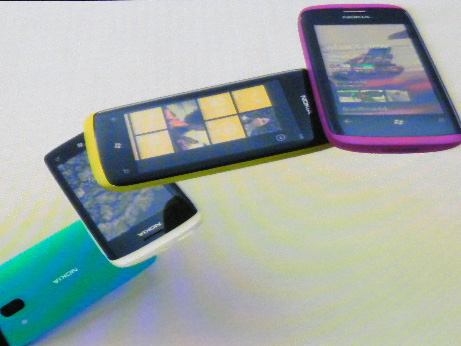What if Nokia had gone with Android?
Was Windows Phone a white knight for Nokia?

Sign up for breaking news, reviews, opinion, top tech deals, and more.
You are now subscribed
Your newsletter sign-up was successful
Remember Nokia? It's still the world's biggest smartphone maker - Gartner's latest state of the smartphone market report shows that Nokia shipped a massive 97.9 million mobile devices in the second financial quarter of this year - but its share of the smartphone market is in free-fall.
Even the good numbers are bad: in Nokia's latest financial report, CEO Stephen Elop reports that "we took action in China and Europe to address an inventory build-up that occurred in the first quarter of 2011".
Inventory build-up is what happens when retailers have lots of your phones and customers aren't buying them. Price cuts helped shift that - "we took a more responsive approach to product pricing around the world", Elop says - but as Gartner points out, "we will not see a repeat of this performance in the third quarter of 2011."
The problem is that we're buying more smartphones than ever before, but most of them aren't Nokia ones. Gartner reports that the Finnish firm's share of the smartphone market fell from 40.9% last year to just 22.1% this year. Android's up from 17.2% to 43.4%, while Apple - currently sitting at 18.1% - will soon overtake Nokia too.
Nokia's betting on its forthcoming Windows Phone line-up to reverse that trend, but what if it's backed the wrong horse? Would Nokia's position be any different if it had embraced Android?
Right idea, wrong OS?
Nokia could have embraced Android in two ways: by betting the farm on a single platform, as it ultimately did with Windows Phone, or by taking more of a Samsung-y, HTC-y approach and making Android one of many OS choices.
Allen Nogee, research director of In-Stat's Wireless Technology Group, points out that an all-Android approach could have been risky. "If Nokia had joined the Android fray and just went to Android, then they would have been competing in the wide Android world against many others - including Google themselves now that Google is buying Motorola Mobility," he says.
Sign up for breaking news, reviews, opinion, top tech deals, and more.
Nokia would have benefited from a mature OS, a thriving marketplace and Android's popularity, but Nokia would also be risking becoming a me-too manufacturer.
There's also the risk of Google playing favourites. "Google has shown that it can play favourites among the players," Nogee says. "Look at Motorola and Honeycomb." Would the benefits outweigh the risks? "I'm not so sure."
The second option, a portfolio approach, might have worked better. It certainly did for Samsung, which has become the king of the Android manufacturers while also doing a nice line in Windows Phone and Bada handsets. "In my opinion, that would have been the best for Nokia," Nogee says. "Since they are so large and service so many separate areas, there is no reason they couldn't have gone Android and MeeGo and Windows Phone."
Phone insurance
By spreading its bets, Nokia would be insured against potential disasters - including far-fetched things such as, say, Google buying a handset company and becoming a direct competitor - and wouldn't be suffering from the catastrophic loss of interest in markets such as China, where Nokia reports that "distributors and operators [were] purchasing fewer of our smartphones during the second quarter 2011 as they reduced their inventories of those devices".
By adding Android Nokia might have maintained market share, but that doesn't mean such a move would be risk-free.
"The downside is that the company doesn't have any character of its own," Nogee points out: Nokia would be like PC firms are to Microsoft, and it "certainly wouldn't have the character that Apple has with its own OS."
Right now, Nokia's future is unclear. "I'm not writing off Microsoft/Nokia just yet," Nogee says, "but unlike some other research companies I'm not forecasting that they will be the leader, or even second place, five years down the road."
For Nogee, the worry is that Windows Phone is too, well, Windows-y. "People don't buy phones to be an extension of their office environment. They buy them as an escape," he says. "The fact that Microsoft is related to desktop Windows, and that Nokia is related to many non-smart phones, doesn't really help either company. Legacy doesn't mean a whole lot in the smartphone world."
Would the future be any brighter if Nokia had gone down the Android route? Probably not: the scenarios we've outlined above are cautious ones rather than the "sod it! Let's go to THE MOON!" bravery of betting the farm on Windows Phone.
Nokia's taken a huge risk, but if it works the benefits could be huge too. "The Nokia/Microsoft deal is certainly not a huge bet," Nogee says, "but it's probably the scenario that has the best chance of letting each company succeed the greatest." Will it work? Ask us again when we've seen the phones - and their sales.

Contributor
Writer, broadcaster, musician and kitchen gadget obsessive Carrie Marshall has been writing about tech since 1998, contributing sage advice and odd opinions to all kinds of magazines and websites as well as writing more than twenty books. Her latest, a love letter to music titled Small Town Joy, is on sale now. She is the singer in spectacularly obscure Glaswegian rock band Unquiet Mind.